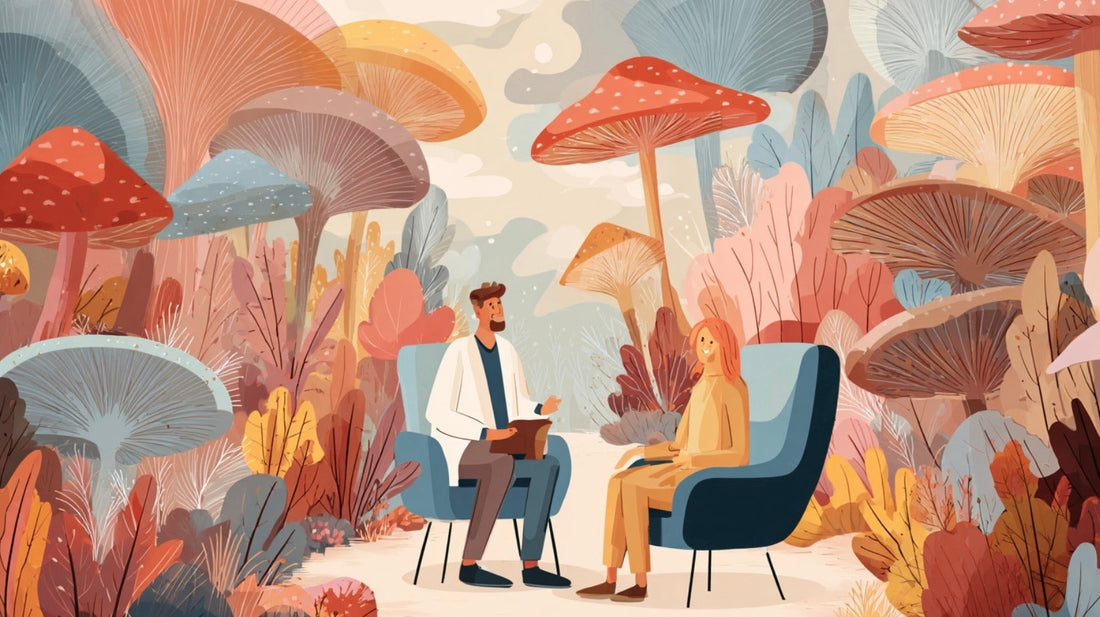
Psilocybin Rescheduling: The Future of Psychedelic Medicine
09/08/25Share
From "Magic Mushrooms" to Mainstream Medicine? The Push for Psilocybin Rescheduling
For decades, "magic mushrooms" have been relegated to the fringes of society, classified as a Schedule I substance with "no accepted medical use." But the tides are turning. A groundswell of scientific research and shifting public opinion is now challenging that long-held stigma, bringing the topic of psilocybin rescheduling into the national spotlight. The federal government is officially reviewing its stance, a move that could unlock a new frontier in mental healthcare. This post explores the science, history, and fierce debate surrounding this potential paradigm shift.
The Science: How Psilocybin Rewires the Brain
When ingested, psilocybin converts to psilocin, a compound that interacts with the brain's serotonin receptors. This interaction can temporarily quiet the brain's "default mode network" (DMN), the part responsible for our sense of self and often linked to ruminating, anxious thoughts. By dialing down the DMN, psilocin allows for new neural connections to form, leading to profound shifts in perception and emotion.
This neurological "reset" is what researchers believe holds the key to its therapeutic potential for conditions like:
- Treatment-Resistant Depression: Studies show it can create lasting positive changes in mood.
- Anxiety and PTSD: It may help individuals process trauma and reduce fear responses.
- Addiction: Early research indicates it could help break cycles of dependency.

The Rocky Road to Psilocybin Rescheduling
Psilocybin's journey has been a long and controversial one. Used for centuries in indigenous spiritual ceremonies, it was thrust into Western consciousness in the mid-20th century. However, its association with the counter-culture movement led to its classification as a Schedule I drug under the Controlled Substances Act of 1970, effectively halting legitimate research for decades.
The recent "psychedelic renaissance" has been driven by institutions like Johns Hopkins and NYU, whose rigorous clinical trials have provided compelling evidence of psilocybin's safety and efficacy in controlled settings. This new wave of data is the primary force behind the current push for psilocybin rescheduling.

The Debate: Risks, Ethics, and the Future of Therapy
Despite the promising results, rescheduling is not without controversy. A major concern is the stark difference between psilocybin-assisted therapy in a clinical setting and unsupervised recreational use, which carries risks of "bad trips" and psychological distress.
Key ethical questions include:
- Accessibility and Cost: Will this therapy be affordable and covered by insurance?
- Therapist Training: How do we ensure a supply of properly trained professionals?
- Informed Consent: How is consent handled when a substance alters perception so profoundly?
Addressing these challenges is critical to ensuring that the therapeutic potential of psilocybin is harnessed safely and equitably.

Conclusion: A New Era for Mental Health?
The potential psilocybin rescheduling represents more than just a change in drug policy; it signals a potential revolution in how we understand and treat mental illness. While the road ahead is complex, the growing body of evidence suggests that what was once dismissed as "magic" may soon become a cornerstone of mainstream medicine.
What are your thoughts on this topic? Share your opinion in the comments below! To learn more about the latest research, visit a reputable source like the Multidisciplinary Association for Psychedelic Studies (MAPS).
Frequently Asked Questions about Psilocybin
What does it mean if psilocybin is rescheduled to Schedule II?
Rescheduling to Schedule II would acknowledge that psilocybin has accepted medical uses, allowing doctors to prescribe it and researchers to study it with fewer restrictions. It would still be a controlled substance.
Is psilocybin the same as microdosing?
No. Psilocybin-assisted therapy involves a full, guided psychedelic experience. Microdosing involves taking sub-perceptual amounts, and its therapeutic benefits are still under scientific investigation.
Can psilocybin cure depression?
While studies are very promising for treatment-resistant depression, it's not considered a "cure." It's a powerful tool that, when combined with therapy, can lead to significant and lasting remission of symptoms for many individuals.
What are the main risks of psilocybin therapy?
In a controlled setting, risks are minimized but can include temporary anxiety, paranoia, and increased heart rate. Unsupervised use carries greater risks, including psychological distress and potential for accidents.
How is psilocybin-assisted therapy different from recreational use?
It's a structured process involving preparation sessions, a supervised psychedelic experience with trained therapists, and integration sessions afterward to process the insights gained.
Will psilocybin become legal everywhere in the US?
Federal rescheduling would not automatically make it legal everywhere. States would still need to create their own laws and regulatory frameworks for medical or therapeutic use, similar to cannabis.
Are there any long-term side effects?
Current research has not identified significant long-term negative side effects when used in controlled, therapeutic settings. However, more long-term studies are needed.
Who should not take psilocybin?
Individuals with a personal or family history of psychosis (like schizophrenia or bipolar disorder) are typically excluded from clinical trials due to potential risks.
What is the 'default mode network' (DMN)?
The DMN is a network of brain regions that is active when we are at rest and engaged in self-referential thought, like daydreaming or worrying. Overactivity in the DMN is linked to depression.
Where is psilocybin therapy currently legal?
As of now, Oregon is the only state with a regulated therapeutic access program. Colorado has decriminalized personal use and is developing its own regulatory model.





